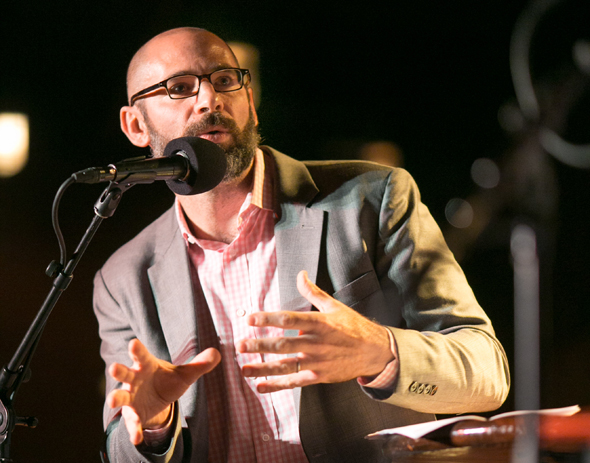Sign up for the daily CJR newsletter.

In July, David Plotz announced that he would be ending his six-year tenure as editor of Slate. Plotz, who remained on staff as editor at large after his announcement, has worked at Slate since it launched in 1996, when it was one of the first magazines to publish exclusively online. But even as other digital publications have proliferated, Slate, with an audience of 25 million, has remained a defining presence in the online world. CJR’s Christopher Massie asked Plotz about how the magazine has evolved, and what he’s doing next.
Slate initially helped set the standard for what an online magazine could be. To what extent does Slate still define the idea of an online magazine? No one defines what an online magazine is anymore. Is Gawker a magazine? Is Business Insider a magazine? I don’t know. The categories have lost designation.
‘I think people spend more time on [Slate’s] podcasts than they do on the magazine.’
You expressed pride in the range of content that appears on Slate. You mentioned, as extremes on the spectrum, the “Adele Dazeem Name Generator” and Josh Levin’s longform “Welfare Queen” story. How do you see serious pieces blending with goofy pieces in a person’s reading experience? I think everyone has times when they want an “Adele Dazeem Name Generator” and times when they want Josh Levin’s “Welfare Queen” story. I think it’s a false choice to say that these are different categories of people. The internet doesn’t work like a print magazine. You don’t pull people into Slate through one thing and then they stay for another. Slate definitely has a hardcore audience that visits its homepage and consumes lots of content all at once. But, on the internet as a whole, people are consuming individual pieces of content; they’re not consuming entire brands all at once.
Is Slate’s brand at all diminished by the goofier content? No. If that were 50 percent of what Slate were doing, that would be true. But these are delightful little treats. Doing these little bits of pleasure, which don’t have major policy points to make, is not simply neutral. It’s actively good. It brings people pleasure, it brings them to the site, it provides joy in the world.
Why did you make podcasts a bigger component of Slate’s content? For the first three years that we were podcasting, we didn’t have any sense that anyone was listening. And then, starting around 2008, we realized that people are not only listening, they’re super-fans. I think people spend more time on our podcasts than they do on the magazine, even though the audience for the podcast is a tiny fraction of the audience of Slate overall. It creates a loyalty that we can’t match with any print product. The emotional connection that people feel with podcast hosts is enormous. I’ll be sitting somewhere just talking to a friend and people will come up and just thank me. They hear my voice and it’s something deeply connected to them. So as a way of creating positive feelings about Slate, there’s nothing better. As a way of getting people to spend time with Slate, there’s nothing better.
Has the podcast found its home in online magazines, or can it still evolve? There’s no reason to think that if any major brand decided to try it, they couldn’t do something great. Where they’ll fail is if they are unwilling to be playful in the form. It’s a form that demands that you be playful and casual in conversation.
Tell me about your next job. I’m becoming the CEO of Atlas Obscura, which is a website devoted to discovery. Right now, it’s user-generated content where people post photos and information about amazing places they’ve been to or heard about. I was just looking at one today–there’s this island in Japan that is ruled by cats. We’re going to add new journalistic content, add video–it’s going to be like the National Geographic for the 21st century, or like Vice but nice. It has this generosity of spirit and joy in the world that is delightful to be around. I’ve gotten drained by political journalism. It’s really depressing because American politics is really depressing. The chance to do a different kind of journalism which has a sense of mission that is about delight and joy and discovery is appealing.
Has America ever needed a media defender more than now? Help us by joining CJR today.






